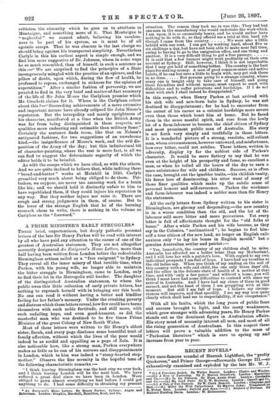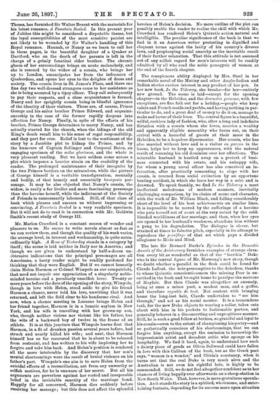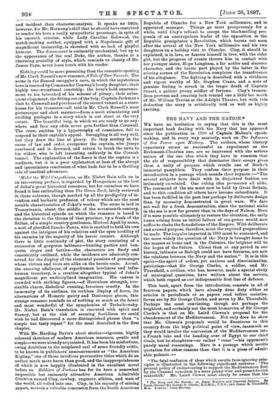RECENT NOVELS.*
THE once-famous scandal of Hannah Lightfoot, the "pretty Quakeress," and Prince George—afterwards George exhaustively examined and exploded by the late Mr. W. .L • (1.) A Fountain Sealed. By Walter Besant. London Chatto sad Windns. —(2.) A Bose of Yesterday. By F. Marion Crawford. London : Macmillan and Co.—(3.) In the Tideway. By Flora Annie Steel. London : Constable and Co.—(4.) My Lord Duke. By E. W. Hornung. London : Cassell ad Co. —(5.) A Tale of Two Tunnels. By W. Clark Russell. London : Chapman and Hall.—(6.) 'Midst the Ws/4 Carpathians. By Maurus Joko.i. Translated by R. Nisbet Bath. London : Jerrold and Sens.—(7.) Soldiers of Fortune. By Richard Harding Davis. London : W. Heinemann. Thome, has furnished Sir Walter Besant with the materials for his latest romance, A Fountain Sealed. In this present year of Jubilee this might be considered a disputable theme, but the loyal susceptibilities of the most sensitive patriot are not likely to be wounded by Sir Walter's handling of this Royal romance. Hannah, or Nancy as we learn to call her in these pages, is the beautiful daughter of a Quaker at Dartford, who on the death of her parents is left in the charge of a grimly fanatical elder brother. The chronic gloom of her surroundings brings on acute melancholy, and she is rescued by the widow of a cousin, who brings her up to London, emancipates her from the influences of Quakerdom, and opens her eyes to the delights of dress and society. The cousin lives in St. James's Place, and there one fine day two well-dressed strangers came to her assistance as she is being accosted by a tipsy officer. They call subsequently to pay their respects, and a dose acquaintance is formed, Nancy and her sprightly cousin being in blissful ignorance of the identity of their visitors. These are, of course, Prince George and his sailor brother Prince Edward, and acquaint- anceship in the case of the former rapidly deepens into affection for Nancy. Finally, in spite of the efforts of his brother, Prince George determines to marry Nancy, and has actually started for the church, when the tidings of the old King's death recall him to his sense of regal responsibility, and they part for ever. Relief is lent to the sentiment of the story by a Jacobite plot to kidnap the Prince, and by the humours of Captain Sellinger and Corporal Bates, an engaging specimen of the miles gloriosus, and the whole is very pleasant reading. But we have seldom come across a plot which imposes a heavier strain on the credulity of the reader. The prolonged maintenance of their incognito by the two Princes borders on the miraculous, while the picture of George himself is a veritable transfiguration, mentally and bodily, of that homely and essentially bourgeois per- sonage. It may be also objected that Nancy's cousin, the widow, is really a far livelier and more fascinating personage than the heroine herself, while the indictment of the Society of Friends is unnecessarily laboured. Still, of that class of book which pleases and amuses us without impressing or convincing, .A Fountain Sealed is a very readable specimen. But it will not do to read it in connection with Mr. Goldwin Smith's recent study of George III.
Mr. Marion Crawford is a constant source of wonder and pleasure to us. He seems to write novels almost as fast as we can review them, and though the quality of his work varies, the average level, in interest and workmanship, is quite extra- ordinarily high. A Bose of Yesterday stands in a category by itself ; the scene is laid neither in Italy nor in America; and though we are given to understand by half-a-dozen un- obtrusive indications that the principal personages are all Americans, a hasty reader might be readily pardoned for thinking that they were English. But if we cannot honestly claim Helen Harmon or Colonel Wimpole as our compatriots, that need not impair our appreciation of a singularly noble- minded heroine and a peculiarly unselfish lover. Twenty or more years before the date of the opening of the story, Wimpole, though in love with Helen, stood aside to give his friend Harmon a chance, never told his love, unwitting that it was returned, and left the field clear to his handsome rival. And now, when a chance meeting in Lucerne brings Helen and her friend together, Harmon is in a lunatic asylum in New York, and his wife is travelling with her grown-up son, who, though neither vicious nor violent like his father, has the wits of a backward boy of twelve in the frame of an athlete. It is at this juncture that Wimpole learns first that Harmon, in a fit of drunken passion several years before, had struck and nearly killed his wife ; and next, that Harmon himself has so far recovered that he is about to be released from restraint, and has written to his wife imploring her to forgive and take him back. And Helen's position is rendered all the more intolerable by the discovery that her son's mental shortcomings were the result of brutal violence on his father's part. Wimpole's one aim is to save Helen from the suicidal effects of a reconciliation, not from any unworthy or selfish motives, for he is unaware of her secret. But all his arguments are powerless against her rooted and insuperable belief in the inviolable sanctity of the marriage bond. Happily for all concerned, Harmon dies suddenly before receiving her message; but this does not affect the splendid
heroism of Helen's decision. No mere outline of the plot can possibly enable the reader to realise the skill with which Mr. Crawford has rendered Helen's Quixotic action natural and intelligible. The peculiar significance of the book is that we find in it an American writer protesting in dignified and eloquent terms against the laxity of his country's divorce laws, and prophesying social anarchy as the inevitable result of their further relaxation. That this attitude is not assumed out of any selfish regard for men's interests will be readily admitted by all who read the noble panegyric of women at the end of the fourth chapter.
The conspicuous ability displayed by Mrs. Steel in her remarkable novel of the Mutiny and other Anglo-Indian and Indian stories excites interest in any product of her pen. In her new book, In the Tideway, she breaks—for her—entirely new ground. The scene is laid—except for the opening chapter—in the Hebrides, and the dramatis personz, with few exceptions, are fine folk out for a holiday,—people who keep valets and French maids and yachts, and having nothing in par- ticular to do, and a great deal of money to do it on, manage to make sad havoc of their lives. The central figure is a beautiful, wilful, reckless lady of fashion, who, after a long and indefinite flirtation with a cousin whom she loves, marries a wealthy and apparently eligible nonentity who turns oat, on their arrival with a houseful of guests at their moor in the Hebrides, to be a hopeless dipsomaniac. Her cousin, who has also married without love and is a visitor en garcon in the house, helps her to keep up appearances, with the natural result of resuming his old dominion over her affections. The miserable husband is hustled away on a pretext of busi- ness connected with his estate, and his unhappy wife, for whom a young naval officer has also conceived an in- fatuation, after practically consenting to elope with her cousin, is rescued from social extinction by an opportune boating accident, in which she loses her way in a mist and is drowned. To speak frankly, we find In the Tideway a most ineffectual melodrama of modern manners, inevitably challenging comparison, by its choice of scene and character, with the work of Mr. William Black, and falling considerably short of the level of his best achievements on similar lines. It is impossible to be moved by the sufferings of a heroine who puts herself out of court at the very outset by the cold- blooded worldliness of her marriage, and then, when her eyes are opened to her husband's weakness, abandons him without a pang to his degradation. The dialogue is clever, but strained at times to falsetto pitch, especially in its attempt to reproduce the persiflage of that set which pays a divided allegiance to Mode and Mind.
The late Sir Bernard Burke's Episodes in the Domestic Annals of the Aristocracy furnishes examples of strange eleva- tion every bit as wonderful as that of the " larrikin " Duke who is the central figure of Mr. Hornung's new story, though we doubt whether a parallel in the flesh could be found for Claude Lafont, the heir-presumptive to the dukedom, thanks to whose Quixotic conscientiousness the missing Peer is un- earthed in the bush and brought home to paralyse the matrons of Mayfair. But then Claude was altogether an anomaly, being at once a minor poet, a modest man, and a golfer, and therefore capable de tout. Not content with bringing home the long-lost heir, Claude undertakes to "see him through," and act as his social mentor. It is a tremendous task, for the new Duke objects to wearing a collar, takes cats about with him in his pockets to fashionable parties, and generally behaves in a disconcerting and unpropitious manner. Still, he is such a good fellow at bottom, so grateful and loyal to his cousin—even to the extent of championing his poetry—and so pathetically conscious of his shortcomings, that we can forgive him anything, except the omission to horsewhip the impressionist artist and decadent critic who sponge on his hospitality. We find it hard, again, to understand how such a dainty piece of goods as Olivia Sellwood could have fallen in love with this Caliban of the bush, but as the Greek poet says, "woman is a wonder," and Olivia's constancy, when it tarns out that the real Duke is very much alive and the Australian is not even his rightful heir, is highly to be commended. Still, we do not feel altogether confident as to her chances of living happily ever afterwards on a sheep-station in New South Wales. That, however, is mere gratuitous specula- tion. As it stands the story is a spirited, wholesome, and enter- taining fantasia, depending for its success more upon situation and incident than character-analysis. It speaks no little, however, for Mr. Hornung's skill that he should have contrived to render his hero a really sympathetic personage, in spite of his uncouth exterior, while Lady Caroline Sellwood, the match-making mother, equipped with a Napoleonic gift of magnificent insincerity, is sketched with no lack of playful humour. The da.ouernent is eminently mechanical, but up to the appearance of the real Duke, the author, thanks to a charming geniality of style, which reminds us closely of Mr. James Payn, never loses touch with his reader.
Nothing could be more promising than the romantic opening of Mr. Clark Russell's new romance, ATale of Two Tunnels. The scene in the disused smuggler's cave, in which the mysterious hero is rescued by Commander Conway's lovely daughter; their highly unconventional courtship; the hero's bold announce- ment to his betrothed of his scheme of piracy ; their subse- quent elopement; the fitting-out of the brig; Captain Jackman s visit to Cornwall and purchase of the second tunnel as a store- house for his treasures—all told in Mr. Clark Russell's most picturesque and alert manner—form a most stimulating and exciting prologue to a story which is cut short at the very outset. The beautiful brig, in which we are ready to go any- where and face any odds, never gets further than Cornwall. The crew, smitten by a hypertrophy of conscience, fail to respond to their captain's appeal. Smuggling is all very well, but they draw the line at piracy. So they mutiny in the cause of law and order, overpower the captain, who jumps overboard and is drowned, and return to break the news to his widow, who is left lamenting endlessly in the Cornish tunnel. The explanation of the fiasco is that the captain is a madman, but it is a poor explanation at best of the abrupt and ignominious conclusion of what bade fair to be a thrilling tale of nautical adventure.
'.Midst the Wild Carpathians, as Mr. Nisbet Bain tells us in an interesting preface, is regarded by Hungarians as the best
of Jokai's great historical romances, but for ourselves we have
found it less enthralling than The Green Book, lately reviewed in these columns, though marked by all the prodigality of in-
vention and barbaric profusion of colour which are the most notable characteristics of Jokai's works. The scene is laid in Transylvania, about the middle of the seventeenth century, and the historical episode on which the romance is based is the elevation to the throne of that province, by a freak of the Sultan, of a simple country gentleman, Michael Apafi by name, a sort of glorified Sancho Panza, who is enabled to hold his own against the intrigues of his relatives and the open hostility of his enemies by the sagacity of his heroic consort. Although there is little continuity of plot, the story consisting of a succession of gorgeous tableaux—hunting parties and ban- quets, sieges and battles—the characters are finely and consistently outlined, while the incidents are admirably con- trived for the display of the elemental passions of personages whose virtues and vices are alike on the heroic scale. Azrael, the amazing odalisque, of superhuman loveliness and infra- human treachery, is a creation altogether typical of Jokai's magnificent yet undisciplined imagination. His canvas is crowded with striking figares,—of Herculean strength, irre- sistible charm, diabolical cunning, ferocious cruelty. In the
immensity of its outlines, its reckless display of force, its alternations of Homeric gaiety and Dantesque gloom, this
strange romance reminds us of nothing so much as the latest and most wonderful of the symphonies of Tschaikowsky. Mr. Nisbet Bain's translation is executed with spirit and fluency, but at the risk of seeming fastidious we could wish he had discovered a more distinguished phrase than "a simple but tasty repast" for the meal desmibed in the first chapter.
With Mr. Harding Davis's short stories—vigorous, highly coloured sketches of modern American manners, gentle and simple—we were already acquainted. It has been his misfortune, owing doubtless to the misplaced zeal of some friendly critic, to be known in publishers' announcements as "the American Kipling," one of those invidious provocative titles which do an author much more harm than good, and the inappropriateness
of which is now happily illustrated in the excellent novel before us. Soldiers of Fortune has for its hero a somewhat
impossible but eminently attractive American Admirable Crichton named Clay, cowboy, engineer, athlete, and man of the world, all rolled into one. Clay, in his capacity of mining expert, secures a valuable concession from the South American Republic of Olancho for a New York millionaire, and is appointed manager. Things go most prosperously for a while, until Clay's refusal to accept the blackmailing pro- posals of an unscrupulous leader of the opposition in the Republic precipitates a Revolution, which bursts out soon after the arrival of the New York millionaire and his two daughters on a holiday visit to Olancho. Clay, it should be explained, is in love, or fancies himself in love, with the elder girl, but the progress of events throws him in contact with her younger sister, Hope Langham, a far nobler and sincerer character, and the heroic part played by the latter in the stirring scenes of the Revolution completes the transference of his allegiance. The fighting is described with a vividness and vigour worthy of Mr. Stephen Crane, and a note of genuine feeling is struck in the tragic death of Captain Stuart, a gallant young soldier of fortune. Clay's tremen- dous prowess and amazing luck remind one a little too much of Mr. William Terriss at the Adelphi Theatre, but with this deduction the story is artistically told as well as highly exciting.




















































 Previous page
Previous page